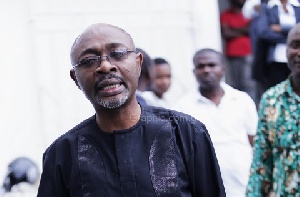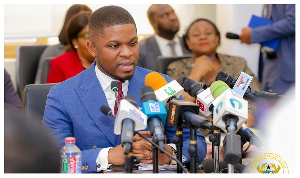The Supreme Court on Monday put on hold its ruling on an interpleader action filed by defunct UT Bank claiming ownership of some properties of Mr Alfred Agbesi Woyome that the state had identified to sell to defray part of the GH¢51.2million debt owed the state by the businessman.
The ruling was to decide whether or not the two houses that the state has identified belong to Mr Woyome or the defunct UT bank.
Justice Anthony Benin, solely presiding made the decision based on a review application filed by Mr Woyome on Monday.
Counsel for Mr Woyome, Madam Petrina Defia, told the court that they had filed a review application seeking to have a three-member panel of the court quash the decision of Justice Benin to entertain the case earlier, on December 3, 2018.
The court on the said date refused an objection from counsel for Mr Woyome, who argued that the application ought to have started at the High Court so that the losing party could have a right to appeal.
Deputy Attorney General, Godfred Yeboah Dame, nonetheless argued that the application to arrest the expected court ruling was filed out of time.
However the court held that it would be for the review panel to determine that and therefore put on hold its ruling and adjourned the matter sine die.
Mr Woyome, the Attorney General and the receivers of the defunct UT bank, Mr Vish Ashiabgor and Mr Eric Nana Nipah are before the Court, with the bank claiming ownership of the two houses on the basis that Mr Woyome sold the properties to UT bank.
The state, on the other hand, is seeking to prove that the said properties were still for Mr Woyome and that the UT bank through its receivers and Mr Woyome are colluding to prevent the sale of the two houses to offset part of monies owed the state.
The UT Bank, in April 2016, claimed ownership of the properties when the state attempted to auction them.
The Manet Towers branch of then UT Bank claimed the two residential properties at Trasacco in Accra.
Lawyers for then UT Bank filed a notice of claim at the High Court for the properties and served notice on the A-G’s Department.
The effect of the claims is that the state cannot sell those properties until it is proven that the bank’s claim is false.
The Supreme Court, on July 29, 2014, ordered Woyome to refund GH¢51.2 million to the state on the grounds that he was paid the money through deception.
Woyome went to the International Court of Arbitration to contest the court’s decision after reneging on his promise to the Supreme Court to pay the money by the end of December 2015.
On March 1, 2016, Woyome prayed the court to give him three years to pay back the money but the court declined to grant his wish.
The court in a 2014 review decision held that the contracts upon which Woyome made and received the claim were in contravention of Article 181 (5) of the 1992 Constitution of Ghana which requires such contracts to be laid before and approved by Parliament.
General News of Tuesday, 22 January 2019
Source: ghananewsagency.org













